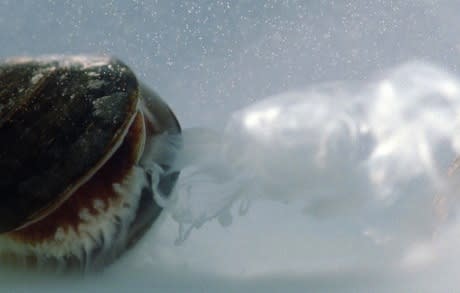Mussels are gross: they're slimy; they look like hard-shelled vaginas; and both male and female mussels ejaculate in order to reproduce. Yet people still gobble up these edible bivalves, savouring them in various dishes at restaurants all over the world.
Mussels in Love explores the titular mollusc, covering everything from the way they procreate — excreting a milky white substance as a sort of underwater cross-pollination method of sex — to their conservation and place in-and-outside of the culinary world.
Director Willemiek Kluijfhout utilizes stop-motion footage to show how mussel beds grow, how they reproduce and even how they spawn. One of the marine biologists featured in the film describes the act of mussel lovemaking as "a big orgy," where they all expel their seed simultaneously en masse, which is particularly delightful when viewed in high definition.
Beyond watching mussels copulate in intimate detail, this part environmental, part informational doc features a culinary segment for foodies, detailing the many ways in which the visually nasty delicacy is consumed. Dutch chef Sergio Herman, whose three-star Michelin restaurant is famed for its recipes, shares his craft and love of mussels with viewers.
It's a method of ensuring comprehensive coverage of the subject before diving into bigger talking points about the farming of mussels, wherein a Zeeland fisherman named Henk shows how mussels are seeded and harvested. Henk's family has been harvesting mussels for several generations and, thanks to recent regulatory changes in the Netherlands, now faces uncertainty, as he may soon be unable to carry on the family trade.
Kluijfhout's documentary covers a great deal of ground in its meagre 73 minutes. Much of it is fascinating, but the sheer onslaught of information ultimately proves too overwhelming and resultantly slight to be entirely effective. The fishing industry is given a fair amount of exposure, bringing up environmental points, but its brevity and broadness are quite unclear when juxtaposed with topically related, but thematically disparate material.
There's also a debate regarding the pros and cons of mussel seed capturing that is under-explored. Something like this could have gone a long way in providing additional scientific fact and legitimacy, but instead, there's an abundance of emotional discourse, speculating rather than proving.
The result is a cutesy film that features plenty of titbits of information pertaining to mussels. However, its slight nature leaves only the graphic mussel sex scenes sticking around after the credits roll.
(Kinosmith)Mussels in Love explores the titular mollusc, covering everything from the way they procreate — excreting a milky white substance as a sort of underwater cross-pollination method of sex — to their conservation and place in-and-outside of the culinary world.
Director Willemiek Kluijfhout utilizes stop-motion footage to show how mussel beds grow, how they reproduce and even how they spawn. One of the marine biologists featured in the film describes the act of mussel lovemaking as "a big orgy," where they all expel their seed simultaneously en masse, which is particularly delightful when viewed in high definition.
Beyond watching mussels copulate in intimate detail, this part environmental, part informational doc features a culinary segment for foodies, detailing the many ways in which the visually nasty delicacy is consumed. Dutch chef Sergio Herman, whose three-star Michelin restaurant is famed for its recipes, shares his craft and love of mussels with viewers.
It's a method of ensuring comprehensive coverage of the subject before diving into bigger talking points about the farming of mussels, wherein a Zeeland fisherman named Henk shows how mussels are seeded and harvested. Henk's family has been harvesting mussels for several generations and, thanks to recent regulatory changes in the Netherlands, now faces uncertainty, as he may soon be unable to carry on the family trade.
Kluijfhout's documentary covers a great deal of ground in its meagre 73 minutes. Much of it is fascinating, but the sheer onslaught of information ultimately proves too overwhelming and resultantly slight to be entirely effective. The fishing industry is given a fair amount of exposure, bringing up environmental points, but its brevity and broadness are quite unclear when juxtaposed with topically related, but thematically disparate material.
There's also a debate regarding the pros and cons of mussel seed capturing that is under-explored. Something like this could have gone a long way in providing additional scientific fact and legitimacy, but instead, there's an abundance of emotional discourse, speculating rather than proving.
The result is a cutesy film that features plenty of titbits of information pertaining to mussels. However, its slight nature leaves only the graphic mussel sex scenes sticking around after the credits roll.
